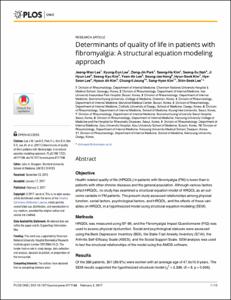KUMEL Repository
1. Journal Papers (연구논문)
1. School of Medicine (의과대학)
Dept. of Internal Medicine (내과학)
Determinants of quality of life in patients with fibromyalgia: A structural equation modeling approach
- Keimyung Author(s)
- Kim, Sang Hyon
- Department
- Dept. of Internal Medicine (내과학)
- Journal Title
- PloS One
- Issued Date
- 2017
- Volume
- 12
- Issue
- 2
- Abstract
- Objective
Health-related quality of life (HRQOL) in patients with fibromyalgia (FM) is lower than in
patients with other chronic diseases and the general population. Although various factors
affect HRQOL, no study has examined a structural equation model of HRQOL as an outcome
variable in FM patients. The present study assessed relationships among physical
function, social factors, psychological factors, and HRQOL, and the effects of these variables
on HRQOL in a hypothesized model using structural equation modeling (SEM).
Methods
HRQOL was measured using SF-36, and the Fibromyalgia Impact Questionnaire (FIQ) was
used to assess physical dysfunction. Social and psychological statuses were assessed
using the Beck Depression Inventory (BDI), the State-Trait Anxiety Inventory (STAI), the
Arthritis Self-Efficacy Scale (ASES), and the Social Support Scale. SEM analysis was used
to test the structural relationships of the model using the AMOS software.
Results
Of the 336 patients, 301 (89.6%) were women with an average age of 47.9±10.9 years. The
SEM results supported the hypothesized structural model (χ2 = 2.336, df = 3, p = 0.506). The final model showed that Physical Component Summary (PCS) was directly related to
self-efficacy and inversely related to FIQ, and that Mental Component Summary (MCS) was
inversely related to FIQ, BDI, and STAI.
Conclusions
In our model of FM patients, HRQOL was affected by physical, social, and psychological
variables. In these patients, higher levels of physical function and self-efficacy can improve
the PCS of HRQOL, while physical function, depression, and anxiety negatively affect the
MCS of HRQOL.
- Keimyung Author(s)(Kor)
- 김상현
- Publisher
- School of Medicine
- Citation
- Jeong-Won Lee et al. (2017). Determinants of quality of life in patients with fibromyalgia: A structural equation modeling approach. PloS One, 12(2), e0171186–e0171186. doi: 10.1371/journal.pone.0171186
- Type
- Article
- ISSN
- 1932-6203
- Appears in Collections:
- 1. School of Medicine (의과대학) > Dept. of Internal Medicine (내과학)
- 파일 목록
-
-
Download
 oak-2017-0365.pdf
기타 데이터 / 785.11 kB / Adobe PDF
oak-2017-0365.pdf
기타 데이터 / 785.11 kB / Adobe PDF
-
Items in Repository are protected by copyright, with all rights reserved, unless otherwise indicated.